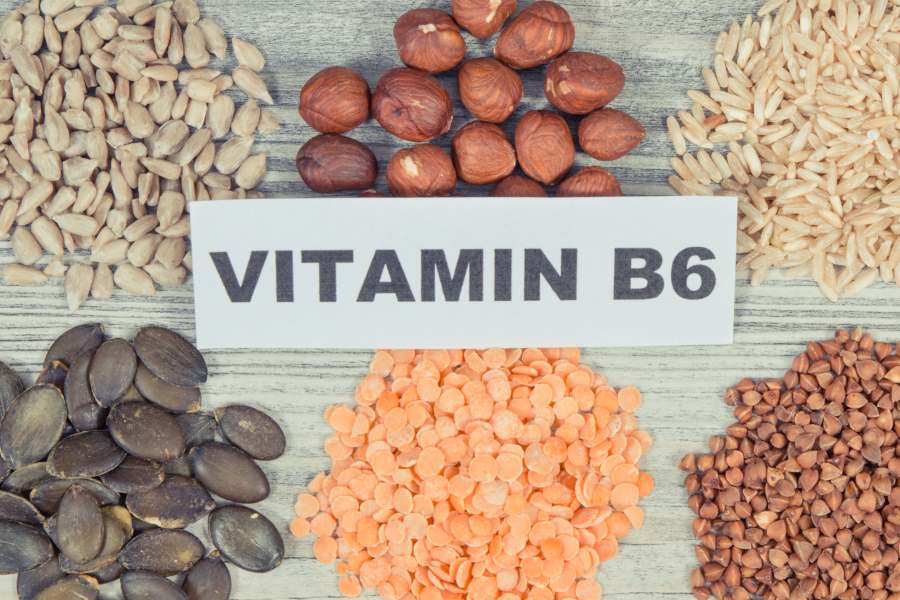14 Signs and Symptoms of Vitamin B6 Deficiency

Individuals having vitamin B6 deficiency might notice symptoms like skin rashes, mood swings, tingling sensation and pain in the hands and feet. Several factors such as consuming vitamin B6 inactivating drugs, excessive alcohol, or medical conditions like malabsorption can cause a deficiency.
Stay tuned to know more about the causes and symptoms of this nutrient deficiency and the ways of recovery.

Table of Contents

What is Vitamin B6 Deficiency?
Vitamin B6 deficiency usually occurs along with a low level of other B vitamins such as vitamin B12 (cobalamin) and vitamin B9 (folic acid). It can cause biochemical changes, becoming more apparent with gradual increase in deficiency level.
Vitamin B6, also known as pyridoxine, is one of the central molecules in cells of a living organism. It is also associated with more than 150 enzymatic reactions as a coenzyme, thus playing a crucial role in the functioning of cells.
How Common is Vitamin B6 Deficiency?
It is rare to have an isolated vitamin B6 deficiency; instead, low levels of other B-complex vitamins, like folic acid and vitamin B12, are typically linked to poor vitamin B6 status.
A number of variables, including age, food, medical problems, and prescription use, can affect the prevalence. Because fortified meals and dietary supplements are readily available, deficiencies are comparatively uncommon in developed countries.
What are the Signs & Symptoms of Vitamin B6 Deficiency?
A low level of vitamin B6 can result in the following symptoms -
| Sr.No | Symptoms | Description |
| 1 | Cracked or Sore Lips | One of the major vitamin B6 deficiency symptoms is cracked or sore lips. In medical terms, this condition is known as Cheilosis, characterised by red, swollen lips with cracked mouth corners. Individuals may experience bleeding in these areas, leading to infections. |
| 2 | Sore Tongue | Inadequacy of pyridoxine can lead to glossitis, marked by a swollen, red, and inflamed tongue. Deficiency of vitamin B6 and B9, and B12 can also result in a smooth or glossy tongue due to loss of papillae. Individuals suffering from glossitis have difficulty chewing, talking and swallowing. |
| 3 | Skin Rashes | Symptoms of vitamin B6 deficiency in adults include skin rashes. Additionally, individuals with insufficient pyridoxine suffer from red itchy rashes, called seborrhoeic dermatitis, in particular areas such as the scalp, face, upper chest, and neck. |
| 4 | Mood Changes | Inadequate vitamin B6 impacts one’s mood and can lead to mental issues like depression, irritability, anxiety, etc. |
| 5 | Low Energy | If an individual feels unusually tired, it might indicate a low level of vitamin B6. One of the primary reasons is that pyridoxine helps make haemoglobin, which further aids in oxygen circulation throughout the body. Insufficient oxygen levels can lead to anaemia, resulting in weakness and fatigue. |
| 6 | Weak Immune System | A low level of vitamin B6 leads to decreased production of antibodies, white blood cells and other immune factors, which are essential to prevent infections, inflammations and various cancers. |
| 7 | Seizures | Seizures are one of the common signs of the presence of insufficient vitamin B6 in a body. Individuals can have symptoms like muscle spasms, rolling eyes, jerking in legs and arms, convulsions, loss of consciousness. However, seizures are more seen in infants but can happen with adults. |
| 8 | Tingling Pain | When individuals have inadequate vitamin B6, they suffer from nerve damage known as peripheral neuropathy. Symptoms include burning, shooting and tingling pain in arms, legs, feet and hands. This medical condition can lead to difficulty walking, clumsiness and balance problems. |
| 9 | Increased Level of Homocysteine | Insufficiency of vitamin B6 and B9, and B12 results in an increased level of homocysteine, a by-product of protein digestion. A high level of homocysteine can lead to health issues like heart problems, Alzheimer’s disease, and stroke. |
| 10 | Confusion and Cognitive Impairment | Inadequate levels of vitamin B6 can impair cognitive function, leading to confusion, difficulty concentrating, and memory problems. This is due to Vitamin B6's role in neurotransmitter synthesis and brain function. |
| 11 | Weakened Immune Response | Vitamin B6 deficiency can compromise the immune system, making individuals more susceptible to infections. This includes recurrent infections or prolonged recovery times from illnesses. |
| 12 | Mouth Ulcers | Insufficient vitamin B6 can contribute to the development of mouth ulcers or sores inside the mouth. These ulcers can be painful and affect eating and drinking. |
| 13 | Depressed Mood | Beyond general mood changes, severe deficiency in vitamin B6 can contribute to more pronounced symptoms of depression. This is due to its involvement in neurotransmitter synthesis, which affects mood regulation. |
| 14 | Difficulty Sleeping | Vitamin B6 deficiency may disrupt sleep patterns, leading to difficulty falling or staying asleep. This can exacerbate fatigue and affect overall well-being. |
The above list thoroughly clarifies which disease is caused due to deficiency of vitamin B6. Now, let us find out what causes this condition.
Causes of Vitamin B6 Deficiency
Vitamin B6 deficiency can occur due to several reasons. Some of them are:
- Malabsorption syndromes, such as Crohn’s disease, celiac disease, and ulcerative colitis.
- Individuals who have genetic diseases, such as homocystinuria, can cause insufficiency of vitamin B6.
- Certain medications, such as antiepileptic drugs.
- Intake of vitamin B6 inactivating drugs such as antiseizure, isoniazid, hydralazine, and corticosteroids.
- Alcoholism.
- Hyperthyroidism.
Now that you are aware of what causes low vitamin B6, it is time to learn about its long-term effects.
Take a look at the diseases caused by deficiency of vitamin B6.
Effects of Long-term Vitamin B6 Deficiency
If individuals have a low level of vitamin B6 for a long period, it can lead to vitamin B6 deficiency diseases, such as –
- Cognitive decline and dementia.
- Alzheimer’s disease.
- Anaemia.
- Various types of cancer.
- Eye diseases.
- Vitamin B6 deficiency can cause rheumatoid arthritis.
- Cardiovascular diseases.
It is clear from the above discussion that a long-term deficiency of vitamin B6 causes which disease. Therefore, individuals must learn about prevention methods to overcome the health issues related to it.
Diagnosis of Vitamin B6 Deficiency
There are several ways to diagnose vitamin B6 deficiency in individuals. Below are a few common methods:
1. Blood Tests
Blood tests are the primary method used to diagnose vitamin B6 deficiency. Specifically, healthcare providers measure pyridoxal phosphate (PLP) levels, the active form of vitamin B6 in the blood. Low levels of PLP indicate a deficiency. Blood tests may also measure other markers related to vitamin B6 metabolism to confirm the diagnosis.
2. Clinical Evaluation
Healthcare providers also rely on clinical evaluation to diagnose vitamin B6 deficiency. This involves assessing the patient's symptoms and medical history, including dietary habits, alcohol consumption, and any underlying medical conditions that could affect vitamin B6 levels. Symptoms commonly associated with vitamin B6 deficiency, such as neuropathy, anaemia, and cognitive changes, are considered during clinical evaluation.
3. Dietary Assessment
A dietary assessment is often part of the diagnostic process for vitamin B6 deficiency. Healthcare providers review the patient's typical diet to evaluate their intake of vitamin B6 rich foods, supplements, and potential dietary restrictions that may affect absorption. A diet low in vitamin B6 sources can contribute to deficiency and is considered during diagnosis.
What Should You Eat to Overcome Vitamin B6 Deficiency?
Individuals can easily prevent Vitamin B6 deficiency by consuming vitamin B6 rich foods, vegetables, fruits. Here is a list detailing these food items –
- Protein-rich foods such as poultry, fish, organ meats, beef and turkey seafood, nuts and seeds; beans, peas, lentils, and soy products.
- Potatoes and other starchy vegetables.
- Fat-free and low-fat milk, oils, yoghurt, and cheese.
- Fruits, except for citrus fruits.
You can always consult a dietician to get a proper diet chart comprising these food items in appropriate proportions.
Best Food Sources to Overcome Vitamin B6 Deficiency
Include adequate vitamin B6 rich foods in your diet to ensure no deficiency. The lists below have various food items mentioned:
Fruits to Overcome Vitamin B6 Deficiency

The table below shows several fruits that are rich in vitamin B6. Include them in your daily diet to increase vitamin B6 levels:
| Sr.No | Fruits | Nutritional Value |
| 1 | Raw bananas (1 cup) | 0.6 mg |
| 2 | Avocados (1 piece) | 0.5 mg |
| 3 | Mango (dried) (100 gm) | 0.3 mg |
| 4 | Custard apple (100 gm) | 0.2 mg |
| 5 | Raw lemon without the peel (1 cup) | 0.2 mg |
| 6 | Prunes (approx 30 gm) | 0.2 mg |
| 7 | Litchis (1 cup) | 0.2 mg |
| 8 | Pineapple (1 cup) | 0.2 mg |
| 9 | Guavas (1 cup) | 0.2 mg |
| 10 | Pitted dates (1 date) | 0.1 mg |
| 11 | Jackfruit (1 cup) | 0.5 mg |
Vegetables to Overcome Vitamin B6 Deficiency

These vegetables have vitamin B6 packed inside them. Have any of these daily to ensure adequate vitamin B6 intake:
| Sr.No | Vegetables | Nutritional Value |
| 1 | Boiled sweet potatoes (1 cup) | 0.5 mg |
| 2 | Cooked spinach (1 cup) | 0.4 mg |
| 3 | Cooked red bell pepper (1 cup) | 0.4 mg |
| 4 | Cooked lady fingers/okra (1 cup) | 0.3 mg |
| 5 | Cooked onions (1 cup) | 0.3 mg |
| 6 | Cooked broccoli (1 cup) | 0.3 mg |
| 7 | Cooked green peas (1 cup) | 0.3 mg |
| 8 | Cooked tomatoes (1 cup) | 0.2 mg |
| 9 | Raw cauliflower (1 cup chopped) | 0.2 mg |
| 10 | Cooked turnips (1 cup) | 0.1 mg |
| 11 | Raw brinjal (1 cup) | 0.1 mg |
Other Eatables to Overcome Vitamin B6 Deficiency

Below are a few more options for foods packed with vitamin B6. check the table below to choose your vitamin B6 preferred food:
| Sr. No | Food Items | Nutritional Value |
| 1 | Raw buckwheat (1 cup) | 0.4 mg |
| 2 | Cooked brown rice (1 cup) | 0.3 mg |
| 3 | Cooked quinoa | 0.2 mg |
| 4 | Salmon (approx. 170 gm) | 1.6 mg |
| 5 | Cheddar cheese (100 gm) | 0.1 mg |
| 6 | Buttermilk (1 cup) | 0.1 mg |
| 7 | Plain yoghurt (1 cup) | 0.1 mg |
| 8 | Raw eggs (1) | 0.1 mg |
| 9 | Chicken breast (approx. 170 gm) | 1.6 mg |
Calculate Your Health Metrics Instantly
How Much Vitamin B6 Do You Need Daily?
A lack of vitamin B6 is typically accompanied by deficiencies in other B vitamins, including vitamin B12 and folic acid (vitamin B9). For those over 50, 1.3 milligrams of vitamin B6 should be taken daily. The recommended daily dose for women is 1.5 milligrammes, and for males is 1.7 milligrammes beyond the age of 50.
Diseases Caused Due to Vitamin B6 Deficiency
There are many diseases linked to vitamin B6 deficiency. Microcytic anaemia, electroencephalogram irregularities, dermatitis with cheilosis (lip scaling and mouth cracking) and glossitis (tongue swelling), disorientation and depression, and compromised immune systems are all linked to vitamin B6 insufficiency.
Treatment for Vitamin B6 Deficiency
Treatment of vitamin B6 deficiency usually involves dietary changes and vitamin B6 supplementation. Here are the recommended treatments:
| Treatment Method | Description |
| Dietary Changes | Increasing the consumption of foods rich in vitamin B6 is the primary approach to treating mild deficiencies. Foods such as poultry, fish, potatoes, bananas, chickpeas, and fortified cereals should be included in the diet regularly to ensure an adequate intake of vitamin B6. |
| Vitamin B6 Supplements | For moderate to severe deficiencies or cases where dietary adjustments alone are insufficient, vitamin B6 supplements may be prescribed. These supplements are available in various forms, such as pyridoxine hydrochloride or pyridoxal-5-phosphate (the active form of vitamin B6). |
| Underlying Condition Treatment | Addressing the primary condition is crucial if vitamin B6 deficiency is due to an underlying medical condition, such as kidney disease or malabsorption disorders. This may involve treating the underlying disease or condition that impairs vitamin B6 absorption or utilisation. |
| Monitoring and Follow-Up | Regular monitoring of vitamin B6 levels through blood tests is important during treatment. This allows healthcare providers to assess the effectiveness of interventions and adjust treatment plans as needed to maintain optimal vitamin B6 levels. |
How to Prevent and Overcome Vitamin B6 Deficiency?
Consume a range of foods high in vitamin B6 as part of a balanced diet. If your doctor advises it, take a vitamin B6 supplement. Steer clear of smoke and alcohol. People should take vitamin B6 supplements orally if they are deficient in the vitamin or if they are taking medication that causes the body to lose vitamin B6. For adults, supplementing with vitamin B6 generally resolves the shortage.
How Long Does It Take to Overcome Vitamin B6 Deficiency?
Most nutritional deficiencies take up to 6 months to resolve with proper treatment. Patients can observe improvements before this time as well, depending on the treatment procedure. The exact time required to correct vitamin B6 deficiency entirely depends on the nutrient level in a body and the severity of the condition.
The above discourse on vitamin B6 deficiency, symptoms, and causes will hopefully help in the early identification of such a condition. Accordingly, Individuals can take necessary precautions to avoid a deficiency or consult a professional for recovery.
Who is at Risk of Vitamin B6 Deficiency?
Given below are some groups of people at the risk of contracting vitamin B6 deficiency diseases:
1. Poor Dietary Intake
Individuals who do not consume enough foods rich in vitamin B6, such as poultry, fish, potatoes, bananas, and fortified cereals, are at risk of deficiency. Vegetarians and vegans who do not supplement their diets adequately with B6 sources may also be susceptible.
2. People With Certain Medical Conditions
Certain medical conditions can impair the absorption or utilisation of Vitamin B6. These include kidney disease, liver disease, autoimmune disorders affecting the intestines, and genetic conditions that affect vitamin B6 metabolism.
3. Alcoholism
Chronic alcohol consumption can lead to vitamin B6 deficiency due to poor dietary intake, impaired absorption, increased excretion, and altered metabolism of the vitamin.
4. Older Adults
Ageing is associated with decreased absorption and utilisation of vitamin B6. Older adults may also have reduced intake of B6 rich foods due to changes in appetite, dental health, or socioeconomic factors.
5. Intake of Certain Medications
Certain medications can interfere with vitamin B6 metabolism or increase its excretion, leading to deficiency. Examples include isoniazid (used to treat tuberculosis), penicillamine (used for Wilson's disease), and anticonvulsant medications.
6. Pregnancy and Breastfeeding Mothers
Pregnant and breastfeeding women have increased vitamin B6 requirements. Deficiency during pregnancy can negatively impact fetal development, while breastfeeding mothers may require additional B6 to meet their own and their baby's needs.
Prevent the risk of low vitamin B6 by taking proper precautions and ensuring adequate vitamin B6-rich foods in your daily diet. For best results, take supplements if required after being prescribed by a medical practitioner.
Protect What Matters - Explore Other Insurance Options














